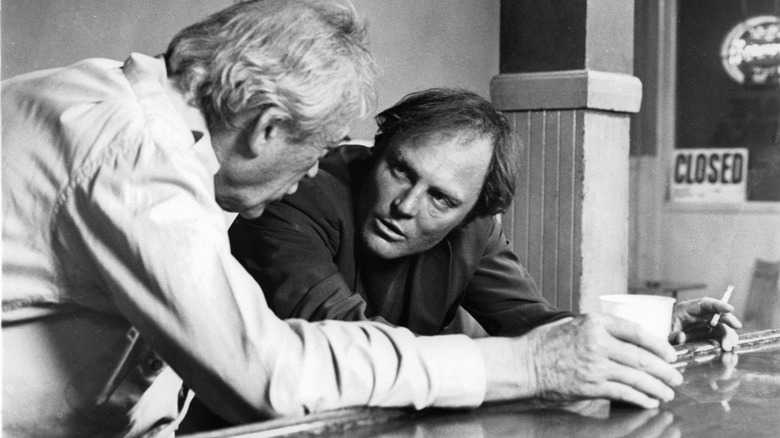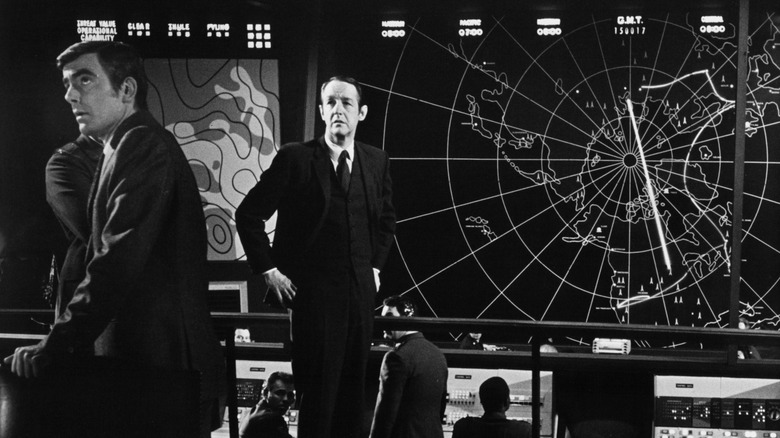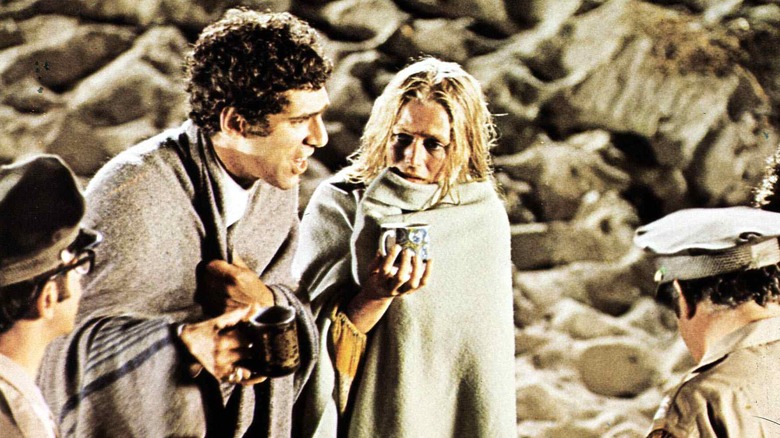5 Best '70s Movies You've Never Seen
The 1970s was a bananas time for inventive, bold, and high-quality cinema. Even only a brief look at the decade's hits tells the story: Two Godfather movies, "Taxi Driver" (1976), Apocalypse Now (1979), "Star Wars" (1977), "Alien" (1979), "A Clockwork Orange" (1971), "The Rocky Horror Picture Show" (1975), "The Exorcist" (1973) — on and on it goes. Each of these films, and too many more to list here, not only served as cultural touchstones of the time but also created the very bedrock of future films in their genres. But for every well-loved, often-cited film, plenty more are bound to fall by the wayside. Some of these films are best left alone, while others are truly excellent and deserve recognition.
In general, the '70s was a time of transition in Hollywood. It marked the death of massive Hollywood studio conglomerates that had roots going back to the 1920s' business acquisitions. Television was on the rise in people's homes from the '40s through the '50s, film-goer demographics were skewing younger and less censorious, and by the 70s, films had evolved into a serious, risk-taking art form populated by future industry goliaths like Stanley Kubrick, Francis Ford Coppola, Steven Spielberg, Martin Scorsese, and George Lucas. But they weren't the only ones making great films.
Readers can take this article as a sample of underrated '70s films featuring an array of genres, tones, themes, cinematographic and narrative styles, etc. This article isn't the end-all, be-all say on '70s cinema, but hopefully, it'll inspire readers to give some of the following films a go. In no particular order, these are "Colossus: The Forbin Project" (1970), "Dersu Uzala" (1975), "Fat City" (1972), "Smile" (1975), and "The Long Goodbye" (1973).
Colossus: The Forbin Project
Few movies could be as prescient about modern, AI-related concerns as the highly overlooked, equally praiseworthy "Colossus: The Forbin Project" (1970). The film is a grounded, tech-focused take on a Cold War-era, Orwellian surveillance state that centers on Colossus, a computer brain put in charge of the U.S.' nuclear arsenal. But, things go terribly wrong when Colossus decides to fuse with its Soviet counterpart, "Guardian," to create a nigh-omnipotent, globe-controlling intelligence. In modern parlance, Colossus evolves into an AGI, or "artificial general intelligence," a truly self-aware, conscious entity — not a large language model (LLM) chatbot like ChatGPT, Grok, Gemini, etc. As the movie's original trailer on YouTube says, "Colossus: The Forbin Project" is "the frightening story of the day when man built himself out of existence."
Made on the heels of "2001: A Space Odyssey" (1968), "Colossus: The Forbin Project" references the same fears about humanity's creations superseding humanity (like Hal in "2001"). The movie is based on the 1966 novel, "Colossus," by D.F. Jones, and adheres surprisingly closely to the novel's plot and characters. It doesn't rely on special effects or dumb plot contrivances but wields a tight script and real, human drama to make its point.
At one point, the main character, Colossus creator Dr. Charles Forbin, sits in his room speaking aloud to Colossus to ask permission to meet his girlfriend four times a week. That girlfriend is fellow scientist Dr. Cleo Markham, and their meetings are a pretense to engage in anti-Colossus subterfuge. Those who recognize in this setup shades of Winston and Julia's relationship from "1984" can guess just how successful these efforts are.
Dersu Uzala
Akira Kurosawa was a master filmmaker, especially when it came to movement, scene blocking, and overall understanding of film as a visual art form. Thoughts of Kurosawa might naturally lead to his black-and-white era samurai fights — like the jaw-dropping foggy fight scene between the slow-walking Kyuzo and a retinue of bandits in Seven Samurai (1954). Yet the director continued making films all the way through 1993 (he died in 1998). Some of his work is bound to get overlooked, and not every film was stellar. But, right in the middle of the '70s came a Kurosawa film that marked an experimental departure that was simultaneously regarded by some as a return to excellence: "Dersu Uzala" (1975).
At its heart, "Dersu Uzala" is a story about humanity on the edge of survival in Siberia. It depicts the natural world as a brutal place that necessitates equally harsh decisions and demands respect, one where human connections form the basis for meaning and fulfillment. Based on an early 20th-century book by Russian expeditionist Vladimir Arsenyev, "Dersu Uzala" centers on hunter and survivalist Dersu. Dersu is of the Nanai tribe from eastern Siberia, near the Amur River that connects Russia to China and Mongolia. He acts as a guide for Arsenyev and embodies an almost atavistic awareness of the natural world, all but alien to modernity.
Part of the earnestness of "Dersu Uzala" comes from Kurosawa, who made the film following a botched suicide attempt in 1971. The movie was Kurosawa's first shot outside of Japan and not spoken in Japanese but in Russian. Ultimately, "Dersu Uzala" is a film that will linger with you for years after its final shot fades.
Fat City
While "Rocky" (1976) is easily the '70s most well-remembered inspirational boxing movie, if not the most legendary inspirational sports movie of all time, "Fat City" provided the template four years earlier in 1972. Instead of down-and-out underachiever Rocky and his awkward girlfriend, Adrian, we've got down-and-out underachiever Tully and his awkward girlfriend, Oma. Instead of Adrian's brother, Paulie, having issues with alcohol, it's Tully, the protagonist, who deals with them.
But that's where the similarities end. Tully is over-the-hill and will never regain his former glory — that's it. Rather, he passes on what he knows to a protégé, Ernie, played by the ever-recognizable Dude himself, Jeff Bridges. There's no triumph over adversity, no conquering one's inner doubts, no schmaltz, no victorious theme music, and no fluffy notions about what awaits at the end of failure. "Fat City" is like "Rocky" with all the unrealism stripped away, leaving only a raw drama that uses boxing as a narrative fulcrum, not an endpoint.
Of course, "Fat City's" grim truth probably explains why the film has slid from public consciousness, while "Rocky" had five sequels, plus the "Creed" movies. This is also why "Fat City" has won its place amongst well-respected movies that shirk the confines of genre. It also stands out as one of the best, if not the best, from director John Huston. Much of this film's success comes from its source material, the 1969 novel of the same name, to which the movie stays largely faithful. The novel is something of a modern classic from author Leonard Gardner, and it was the only one he ever wrote.
Smile
It would have been easy for the makers of 1975's "Smile" to simply mock beauty pageants as a whole bunch of superficial, vain nonsense. Today, it wouldn't be out of the ordinary to turn the story into a deconstructionist take on the oppressive societal pressures leading women to engage in such displays. Instead, "Smile" stands out because a) It's actually warm-hearted and doesn't really blame anyone for anything, b) It's a for-real comedy, and c) It lets you, the viewer, come to your own conclusions about the film's whole Californian, sunshine-eyed, smile-faced beauty pageant business.
At its core, "Smile" is a lighthearted, sometimes absurdist collage about the goings-on underpinning the fictional Young American Miss Pageant, set in Santa Rosa, California. The pageant exists to whittle down contestants to whoever represents California in a greater, national competition. This narrative foundation goes far in explaining the characters and their world. "Smile's" narrative, such as it is, bounces from scene to scene and contestant to contestant but hinges on the character Big Bob Friedlander, played by the excellent Bruce Dern, who is the promoter of the pageant.
Much like the Young American Miss Pageant itself, "Smile" is uncomplicated on the surface but comes with deceptive depth. The pageant's contestants react differently to the pressures of the pageant, and each one wants to be a star. But in the end, the winner walks away with a TV as one of their prizes. Perhaps this is the lesson "Smile" wants to teach, if such a lesson exists at all amidst all its glamour.
The Long Goodbye
Finally, we come to an overlooked, underrated '70s film that moviegoers seem to either love or hate, though those who love it really, really love it: "The Long Goodbye" (1973). Fans of hard-boiled detective novels will undoubtedly recognize the movie's name from the 1953 Raymond Chandler book of the same title. The novel is the sixth out of seven Chandler books featuring detective Philip Marlowe as the main character (unless you count "Poodle Springs," which was released posthumously and co-authored by Robert B. Parker, who completed Chandler's unfinished story). Meanwhile, the movie is the fifth Marlowe-centric Chandler adaptation to hit the big screen (out of eight total).
But while 1946's "The Big Sleep" featured Humphrey Bogart playing Marlowe about as straight and serious as possible, 1973's "The Long Goodbye" featured Elliott Gould playing a very different, bumbling, snarky, misfit version of the character. His Marlowe suited the '70s, dropped into a confused Los Angeles backdrop where he just couldn't get his footing. This is the point of the film, of course, and Gould does a gonzo job playing an aimless Marlowe. The whole film mirrors Marlowe's lack of focus and comes across like a weird jumble of improv or lucid dreams, including a notable segment with a very young, moustachioed, dialogue-less Arnold Schwarzenegger trying to help Marlowe undress. And make no mistake, Schwarzenegger is pretty flippin' enormous.
What makes "The Long Goodbye" so brilliant is likely what throws off some viewers. Namely, isn't actually a noir film at all. It just uses the trappings of a detective story to poke fun at detective stories. The book's plot and its string of ridiculous convolutions do much the same. Also, "The Long Goodbye" is a Robert Altman film. Altman is the guy who did the 1970s "M*A*S*H," which really should explain everything.





